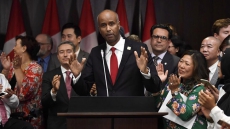VANCOUVER — Greyhound Canada will eliminate or reduce routes in northern British Columbia, the Interior and Vancouver Island amid financial losses and a steep drop in passengers.
Local governments and the province's transportation minister say the company is gutting an essential service.
The Passenger Transportation Board approved Greyhound's application to cut and reduce routes after the company cited millions of dollars in losses due to declining ridership.
The board says in a written decision that passenger demand for the service has declined 46 per cent since 2010.
It says routes that were once profitable are no longer providing enough revenue for the company that receives no subsidies and has lost $70 million over the last six years.
Greyhound vice-president Stuart Kendrick says five routes in northern B.C. will be cut on June 1, no date has been set to abandon the Victoria-to-Nanaimo route, though 14 days' notice will be issued, and service on routes in the Interior will be slashed.
He says the company regrets the changes.
"We've been challenged in the last several years to maintain a viable service and have had the opportunity to communicate that to the minister," Kendrick says. "Most of these corridors are under 10 people a trip so it's not sustainable long term."
The cuts include routes along British Columbia's so-called Highway of Tears, between Prince George and Prince Rupert; Prince George to Valemont at the Alberta border, Dawson Creek to Prince George and Dawson Creek to Whitehorse.
At least 18 women have gone missing or have been murdered along the Highway of Tears, several of the missing were last seen hitchhiking on the route. The provincial government recently launched bus service in the area.
Kendrick says Greyhound has pushed municipal and provincial governments to consider a "community connectivity fund" to provide needed service.
"The connectivity service is basically looking at the government to subsidize a bus service that allows connectivity for the people of B.C. to get from city to city, and whether that's for education or health care or leisure, that is what's needed," he says.
"This isn't just a B.C. thing, it's happening in other rural parts of Canada and that's why we've been trying to right side our business and look at applications to reduce service based on the travel demand."
Transportation Minister Claire Trevena says people rely on Greyhound's long-haul, inter-city service to get to and from major cities.
"Eliminating and reducing service along rural and remote routes will leave people vulnerable, particularly Indigenous communities, women, seniors, children and those living with disabilities," she says in a statement.
Trevena says she will be speaking in the coming weeks with local elected officials, First Nations and others affected by Greyhound's service changes.
The Passenger Safety Board says it held four public hearings in the north last December and received over 1,900 emails, most of them regarding Highway 16, after Greyhound made its application to cut and reduce service.
It also received about 1,000 petition signatures and comments about Greyhound's proposal to eliminate route points, notably Lytton, Cache Creek and Hope via the Fraser Canyon.
Greyhound has operated in B.C. for 90 years and since 2004, has applied six times to eliminate routes or cut service, the board says, adding all the applications were approved based on the company's financial losses.
"Greyhound indicates that its current financial state is critical and urgent and immediate steps are necessary to ensure its long-term financial health," it says, noting that its freight business has been subsidizing passenger operations.
"The users of the buses are some of the most vulnerable people in B.C.," the board says.




